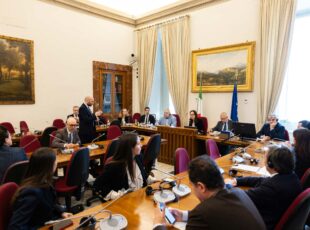UK Foreign Minister: Khodorkovsky’s Release Would be Huge Step in Bringing Foreign Investment to Russia
In the UK’s House of Lords on July 24, Nobel Peace Prize Laureate Lord Trimble secured a debate on Mikhail Khodorkovsky’s applications before the European Court of Human Rights, asking Her Majesty’s Government what representations they had made to the governments of Russia and other European countries about his case.
He called on the Government to firmly oppose human rights abuses and the distortion of democracy, to remind Russians of their obligations as a member of the Council of Europe, to press for a European law on the Magnitsky case and to stop the laundering of dirty money flowing from Russia to the UK.
A number of peers from across the UK political spectrum contributed to the debate, raising concerns regarding the Khodorkovsky case and the continuing deterioration of human rights and the rule of law in Russia. Lord Judd (Labour) raised the numerous economic prisoners currently incarcerated in Russia, and Russia’s ‘telephone justice’ that often results in particular verdicts in those cases. He also raised Magnitsky’s posthumous conviction for tax fraud, the recent crackdowns on NGOs and he called on the Committee of Ministers in the Council of Europe to stop ‘pussy-footing around and pursue Russia relentlessly in carrying out what has been ruled necessary by the European Court.’
Lord Alderdice (Liberal Democrat) stated that Khodorkovsky’s case was important because of its significance regarding the deterioration of freedom and democracy in Russia. He also raised Vasily Alexanyan’s death alongside the cases of Pussy Riot and the 12 defendants in the Bolotnaya Square trials.
Crossbench peer Lord Hylton spoke of the time he met Khodorkovsky when he was visiting London and admired his work with the Open Russia Foundation. He called on the UK Government to press the ECtHR to bring forward consideration of pending applications by both Khodorkovsky and Lebedev in order to prevent the holding of a third trial, and also to lend some protection to Alexei Navalny as he faces similar charges.
Lord Bates (Conservative) spoke of a previous meeting with Khodorkovsky at the 2003 World Economic Forum in Davos, where Khodorkovsky spoke of the importance of corporate governance and independent oversight. He expressed his shock at Khodorkovsky’s arrest later that year and stated it had done ‘immense damage’ to foreign perceptions. He concluded that the UK’s failure to understand Russia has been one of the greatest weaknesses of British foreign policy throughout history.
Baroness Williams also began with a description of the times she had come across Khodorkovsky when speaking at various higher education institutions in Moscow and other parts of Russia. She spoke of his ‘crazy kind of courage’ in speaking out honestly about things that concerned him.
The final backbench speaker of the debate was Lord Pannick, who raised the extraordinary delays by the European court in reaching its judgments and the record of the Russian Federation in Strasbourg citing that 122 of the 134 substantive judgments in cases concerning the Russian Federation in 2012 found at least one violation of human rights.
Speaking from the Labour frontbench, the Shadow Cabinet Office minister Lord Wood raised his concerns about access to justice in Russia and asked the Government in what forums they had shared those anxieties with the Russian Government. He also stressed that interest in such matters did not constitute interference in the affairs of the Russian Government, because Russia has international obligations to respect human rights and it is therefore reasonable to ask whether they are living up to their side of the bargain.
In concluding the debate, Baroness Warsi, the Senior Minister of State for the Foreign and Commonwealth Office, assured the Lords present that the Government continues to raise concerns about shortcomings in the Russian judicial process and the wider human rights situations with Russia on many occasions. She stated that the UK is unique among EU member states in holding annual bilateral meetings to allow formal discussions about human rights, which are used as opportunities to hold Russia to account on their human rights obligations.
“In conclusion,” she said, “it is right that the UK continues to call Russia to account for this situation and other cases. Khodorkovsky is due to be released on 15 October 2014. We must continue to encourage Russia to fulfil its commitments to strengthen the rule of law and promote the independence of the judiciary. President Putin has publicly said he wants Russia to move up the international “ease of doing business” tables, and make Russia a more attractive destination for foreign investment. For this to happen, his Government need demonstrably to support the development of a strong civil society and to demonstrate that the rule of law is respected in Russia. Business leaders must see evidence of the fair application of law. It is that climate that will bring foreign investment to Russia. The release of Khodorkovsky and Lebedev would be seen as a huge step internationally towards that goal.”
The full transcript of the 90-minute debate can be read HERE
It can also be re-watched from the archives starting at 22:07 HERE



